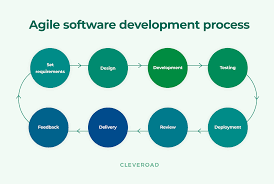Enhancing Experiences Through Exceptional Service Delivery
The Importance of Quality Service
Service plays a crucial role in our everyday lives, whether we are consumers, employees, or business owners. It encompasses the assistance and support provided to fulfill a need or solve a problem. Quality service is not just about meeting expectations; it’s about exceeding them and creating a positive experience for all parties involved.
Customer Service
For businesses, customer service is paramount. It is the frontline interaction between a company and its customers. Good customer service builds trust, loyalty, and satisfaction. It involves listening to customers, addressing their concerns promptly and effectively, and going the extra mile to ensure their needs are met.
Internal Service
Internal service within an organization is equally important. It refers to how different departments or individuals collaborate and support each other to achieve common goals. Effective internal service fosters teamwork, boosts productivity, and creates a positive work environment.
Community Service
Beyond business transactions, service extends to the community. Engaging in community service activities not only benefits those in need but also enriches the lives of volunteers. It promotes social responsibility, empathy, and unity among people from diverse backgrounds.
Service Excellence
Achieving service excellence requires dedication, continuous improvement, and a customer-centric mindset. It involves setting high standards, training employees effectively, collecting feedback for ongoing evaluation, and adapting to meet changing needs and expectations.
The Impact of Service
Quality service has far-reaching effects on individuals and society as a whole. It builds relationships based on trust and mutual respect. It fosters loyalty and repeat business for companies. It creates a sense of belonging and fulfillment for volunteers in community service initiatives.
In conclusion, service is not just a transactional activity; it is a fundamental aspect of human interaction that shapes our experiences and relationships. By prioritizing quality service in all aspects of life, we can contribute to a more harmonious and prosperous society.
8 Key Benefits of Exceptional Service for Business Success
- Enhances customer satisfaction
- Builds trust and loyalty
- Improves brand reputation
- Creates positive customer experiences
- Increases customer retention
- Boosts employee morale
- Fosters strong relationships
- Differentiates a business from competitors
Four Key Drawbacks of Subpar Service and Their Impact on Businesses
- Inconsistent service quality may lead to customer dissatisfaction.
- Poor customer service can damage a company’s reputation and result in loss of business.
- Inadequate internal service within an organization can hinder collaboration and productivity.
- Lack of community service initiatives may limit a company’s positive impact on society.
Enhances customer satisfaction
Enhancing customer satisfaction is a key benefit of quality service. When businesses prioritize meeting and exceeding customer needs, they create positive experiences that build trust and loyalty. By providing excellent service, companies show customers that their concerns are valued and their expectations are not only met but surpassed. This leads to increased customer satisfaction, repeat business, positive word-of-mouth referrals, and ultimately, long-term success for the business. Customer satisfaction is a reflection of the quality of service provided and plays a crucial role in maintaining a competitive edge in today’s market.
Builds trust and loyalty
Building trust and loyalty is a key benefit of quality service. When individuals or businesses consistently deliver exceptional service that meets or exceeds expectations, it creates a strong foundation of trust with customers, clients, or colleagues. This trust forms the basis for long-term relationships and fosters loyalty, as people are more likely to return for future services or recommend the provider to others. By prioritizing building trust and loyalty through excellent service, organizations can establish a positive reputation and differentiate themselves in a competitive market.
Improves brand reputation
Providing excellent service not only meets customer expectations but also goes a long way in enhancing brand reputation. When a company consistently delivers top-notch service, it builds trust and loyalty among customers, leading to positive word-of-mouth recommendations and reviews. A strong brand reputation as a result of exceptional service can attract new customers, retain existing ones, and differentiate the company from competitors in the market. Ultimately, by prioritizing service quality, businesses can solidify their position as trustworthy and reliable entities in the eyes of consumers.
Creates positive customer experiences
Creating positive customer experiences is a key pro of service that can significantly impact a business’s success. When customers receive exceptional service that goes above and beyond their expectations, it not only meets their needs but also leaves a lasting impression. Positive customer experiences build trust, loyalty, and satisfaction, leading to repeat business and referrals. By prioritizing customer satisfaction through outstanding service, businesses can differentiate themselves in the competitive market and establish long-term relationships with their customers.
Increases customer retention
Providing excellent service not only satisfies customers in the moment but also plays a crucial role in increasing customer retention. When customers receive exceptional service that exceeds their expectations, they are more likely to develop a sense of loyalty and trust towards the business. This positive experience creates a strong bond between the customer and the company, making them more inclined to return for future transactions and recommend the business to others. By prioritizing customer satisfaction through quality service, businesses can effectively enhance customer retention rates and build long-lasting relationships with their clientele.
Boosts employee morale
Boosting employee morale is a significant advantage of quality service. When employees feel valued and supported in providing excellent service to customers or colleagues, their job satisfaction and motivation increase. Recognizing and rewarding employees for their efforts in delivering exceptional service not only improves their morale but also fosters a positive work culture where teamwork and dedication are celebrated. Ultimately, high employee morale leads to higher productivity, lower turnover rates, and a more cohesive and efficient workforce.
Fosters strong relationships
Fostering strong relationships is a significant benefit of quality service. By prioritizing customer satisfaction and building trust through exceptional service delivery, businesses can establish long-lasting connections with their clients. These relationships go beyond mere transactions, creating a sense of loyalty and mutual respect. Similarly, within organizations, effective internal service practices promote teamwork and collaboration among employees, leading to a cohesive work environment where individuals support each other towards common goals. Ultimately, the emphasis on fostering strong relationships through service enhances not only business success but also personal and professional growth.
Differentiates a business from competitors
In a competitive market landscape, the quality of service provided by a business can serve as a powerful differentiator from its competitors. Exceptional service that goes above and beyond customer expectations not only attracts new customers but also fosters loyalty among existing ones. When a business consistently delivers outstanding service experiences, it creates a strong reputation that sets it apart in the minds of consumers. By prioritizing top-notch service, a business can establish itself as a preferred choice among competitors and build long-term relationships with customers based on trust and satisfaction.
Inconsistent service quality may lead to customer dissatisfaction.
Inconsistent service quality poses a significant con as it can result in customer dissatisfaction. When customers experience varying levels of service quality, they may feel uncertain and frustrated. This inconsistency can erode trust and loyalty, leading to negative perceptions of the brand or business. Customers expect reliability and consistency in the services they receive, and when these expectations are not met, it can drive them to seek alternatives. Therefore, maintaining a high standard of service quality across all interactions is crucial to ensure customer satisfaction and retention.
Poor customer service can damage a company’s reputation and result in loss of business.
Poor customer service can have detrimental effects on a company’s reputation and bottom line. When customers experience subpar service, whether it be long wait times, unresponsive communication, or unaddressed concerns, they are likely to share their negative experiences with others. Word-of-mouth travels fast, especially in the age of social media, and can tarnish a company’s image swiftly. As a result, potential customers may be deterred from doing business with the company, leading to loss of revenue and market share. It is crucial for businesses to prioritize exceptional customer service to maintain a positive reputation and retain loyal customers.
Inadequate internal service within an organization can hinder collaboration and productivity.
Inadequate internal service within an organization can significantly impede collaboration and productivity. When different departments or individuals fail to support each other effectively, it can lead to miscommunication, delays in decision-making, and a lack of cohesion in achieving common goals. This lack of internal service can create silos within the organization, hindering the flow of information and resources across teams. As a result, productivity may suffer, innovation may be stifled, and overall performance may be compromised. It is crucial for organizations to prioritize internal service to foster teamwork, communication, and a collaborative work culture that drives success.
Lack of community service initiatives may limit a company’s positive impact on society.
The lack of community service initiatives within a company can significantly hinder its ability to make a positive impact on society. Engaging in community service not only benefits the community but also enhances the company’s reputation, fosters goodwill, and builds stronger relationships with stakeholders. By neglecting to participate in such initiatives, a company misses out on valuable opportunities to give back, support local causes, and demonstrate its commitment to social responsibility. Without active involvement in community service, a company may struggle to connect with its surrounding community and may be perceived as disconnected or indifferent to societal needs.












